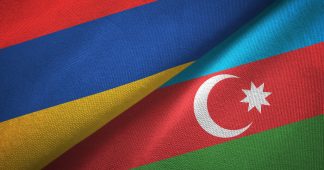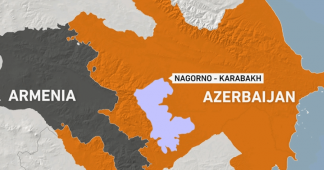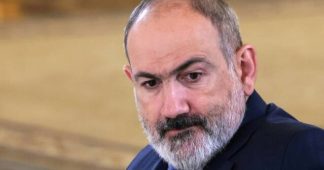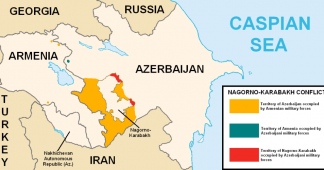Armenian forces surrender all their ammunition to the Azeri army as the warring sides confirm a ceasefire mediated by Russian peacekeepers.
Sep. 20, 2023
Ethnic Armenian forces in Nagorno-Karabakh say they have agreed to a Russian proposal for a ceasefire, a day after Azerbaijan began an offensive to take control of the contested enclave and demanded a full surrender.
The agreement for a ceasefire starting at 1pm local time [09:00 GMT] on Wednesday was also confirmed by Azerbaijan’s Ministry of Defence. The office of President Ilham Aliyev separately confirmed talks with Armenian separatists about “reintegration” with Azerbaijan on Thursday in the town of Yevlkah.
Aykhan Hajizada, spokesperson for the Ministry of Foreign Affairs of Azerbaijan, told Al Jazeera that “after the disarmament and withdrawal of the Armenian armed forces, peace will finally come to the region and the puppet regime will be disbanded.”
Azerbaijan’s former diplomat Farid Shafiyev said that unless the Armenian government decided to get involved – which did not seem likely – Armenian armed forces would likely surrender.
“I think the process will now go smoothly in terms of the negotiations [scheduled] for tomorrow,” Shafiyev, who chairs the Centre of Analysis of International Relations, told Al Jazeera.
Russia’s Ministry of Defence said the ceasefire would be implemented in coordination with Russian peacekeepers stationed in the region.
According to Russia’s Interfax news agency, it was agreed that the remaining units of the Armenian army would be withdrawn from Nagorno-Karabakh and that Karabakh fighters would surrender their weapons.
Whether this will actually be implemented was initially unclear. Armenia has said it has not had troops in the region since August 2021.
Armenian Prime Minister Nikol Pashinyan confirmed the fighting had died down and said it was is “very important” for the ceasefire to hold. “The latest information I have received from Nagorno-Karabakh is that the intensity of fighting has greatly decreased,” Pashinyan said, according to a statement.
However, he said Armenia had not been involved in drafting the ceasefire and that it was not clear to which Armenian armed forces the agreement referred to, given that “Armenia doesn’t have an army in Nagorno-Karabakh.”
Arsen Kharatyan, former advisor to the Armenian Prime Minister, told Al Jazeera there was “major uncertainty about what the next moves are going to be.”
“The feeling here in Yerevan is that sooner or later the Armenian people of Nagorno-Karabakh will have to be evacuated” he said. “You cannot force people to integrate the way Azerbaijan is trying to do.”
“There should be a long process of dialogue and reconciliation if we’re talking about any form of peace,” Kharatyan added.
Nagorno-Karabakh is internationally recognised as part of Azerbaijan but its population of 120,000 is overwhelmingly ethnic Armenian. The territory has its own government, which has enjoyed close links to neighbouring Armenia but has not been officially recognised by it or other United Nations member states.
Azerbaijan began its military operation on Tuesday after some of its troops were killed in what it said were attacks from the mountainous region, which it had blockaded for nine months.
It said it was targeting only military sites but significant damage was visible on the streets of the regional capital, with shop windows blown out and vehicles punctured, apparently by shrapnel. Dozens of people were also reported killed.
On Wednesday, the ethnic Armenian forces said Azeri troops had broken through their lines and seized a number of heights and strategic road junctions.
“In the current situation, the measures taken by the international community to end the war and resolve the situation are insufficient,” Armenpress news agency quoted an authority statement as saying. “Taking this into account, the authorities of the Republic of Artsakh [Nagorno-Karabakh] accept the proposal of the command of the Russian peacekeeping contingent regarding a ceasefire.”
The region in the South Caucasus has been claimed by both Azerbaijan and Armenia for decades, with two wars fought since the collapse of the Soviet Union in the early 1990s.
The second war in 2020 ended with Azerbaijan recapturing areas in and around Nagorno-Karabakh after a 44-day offensive.
Fearful of what the future might hold, crowds of ethnic Armenians made their way to the airport in Stepanakert, the capital of Karabakh which is known as Khankendi by Azerbaijan.
Others took shelter with Russian peacekeepers. Moscow said there were 2,261 people, including 1,049 children, sheltering at the peacekeepers’ base camp
Armenian Prime Minister Nikol Pashinyan has been facing calls from some opponents to resign. The country’s security council said warned of large-scale unrest in the country after protesters took to the streets on Tuesday over the government’s handling of escalating tensions with their neighbour.
Some Armenians are also furious that Russia, which has peacekeepers on the ground and helped broker an earlier ceasefire deal in 2020, was unable to stop Azerbaijan.
The Kremlin rejected that criticism on Wednesday and President Vladimir Putin was quoted as saying that Russian peacekeepers would protect Karabakh’s civilian population.
We remind our readers that publication of articles on our site does not mean that we agree with what is written. Our policy is to publish anything which we consider of interest, so as to assist our readers in forming their opinions. Sometimes we even publish articles with which we totally disagree, since we believe it is important for our readers to be informed on as wide a spectrum of views as possible.










